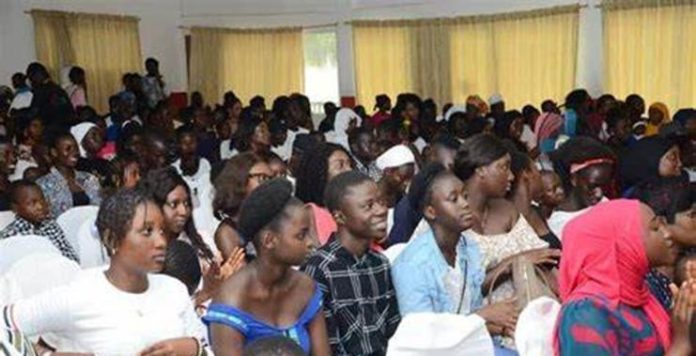By Amadou Manjang
Young people are lazy. They are always involved in criminal activities. They do not want to work. They are not ready to take the leadership positions. They do not have ambition. They only care about social media. These stereotypes against youth float around the internet as well as everyday life.
Such stereotypes were once expressed by the former Vice President Dr Isatou Touray, causing widespread criticism. However, many young Gambians continue to be exposed to stereotypes.
It is common to see young people engaging in petty crimes or camping at roadsides drinking attaya, listening to music or smoking. Such images allow people to brush all young people with the same paint.
But not all young people are the same. There are many young people who camp at roadsides drinking attaya, or listening to music but they are responsible and productive. They engage in such activities during leisure time.
Stereotypes have a negative impact on the life of young people. It has been documented by psychologists that it affects young people’s self-conceptions, esteem, and perception as it can result in brain changes associated with reduced cognitive control. This hurts young people’s ability and productivity.
‘I love to be seen in a positive light’
For young people, the truth in their lives is different from the stereotype they are associated with. Speaking to Foroyaa, they expressed their views of the stereotypes they face.
Everyday after work, Amadou Touray, 27, and his friends camp outside their gate to brew attaya and chat. Amadou is a plumber. Despites being a professional plumber, he argued that many times people told him that he is lazy and lacks ambition just because he camped with friends.
‘This perception of me hurts because it is true. Everyday I go to work and earn a living. I’m a responsible person. I love to be seen in a positive light like any other person.’
Amadou argued it is wrong to negatively talk about, label or simply rule out all young people as lazy, useless, and criminals.
‘Young people are different and they should be given the benefit of the doubt. One shouldn’t just see someone with friends drinking attaya and conclude that the person is aimless, useless or jobless.’
Buba Touray, 26, said stereotypes are used against youth due to misconceptions of the general populace towards young people which affect their participation in the civic space.
‘The cultural view of our elders sees youths as followers and others as irresponsible to mount leadership roles. This and many more hinder our enough representation in the discussion table.’
The 26-years old social worker opined that negative views toward the youth are taking many opportunities away from them.
Buba is a market researcher for private entities and a social worker. He is actively engaged in community service in Bakoteh.
Mariama Sallah, 26, said stereotypes against young people discourage them from pursuing their dreams and aspirations as well as engaging in high competitive initiatives.
‘It kills their spirit that should keep them moving towards the higher level,’ she added.
Sallah is a peace educator with the Peace 360 Initiative-The Gambia that advocates for peace, mental health as well as supporting poor people.
As a young woman, she argued that she faced double stereotypes based on her age and gender: as a youth and as a woman.
‘Yes, as a woman, it is said that we shouldn’t be involved in some forms of leadership training or work towards some position,’ Sallah said.
Fanta Ceesay, 27, added: ‘It made us feel left out. It made us feel unworthy. It feels like we don’t have the capacity and capabilities to take part in decision making. ‘
Fanta argued stereotypes are ‘imposed on young people’ based on their age and gender.’ She said the internalisation of it has stigma and psychological effects on youth which hinders their participation in national development.
Amb. Fanta Ceesay is the Founder and Executive Directress of Treasure Girls Initiative Africa.
Alhagie Comma, 22, said confronting stereotypes is like ‘wrestling with shadows’ that do not exist.’ The shadow casts doubts on young people’s dreams altering their growth.
‘I believe we shouldn’t waste our time in the shadows of unfulfilled dreams, lost potentials and unrealized purposes.’
He pointed out that the stereotype that ‘you can’t make it in the Gambia’ is contributing to increased irregular migration among young people.’
‘Having the belief that if you don’t leave the Gambia then you can’t prosper, is killing so many potentials,’ he connoted.
According to the 2018 Gambia Labour Force Survey, 61,000 Gambians embark on irregular migration majority of whom are young people. An Afrobarrow meter survey found that 56% of Gambians have considered emigrating in search of greener pastures.
Comma is 3rd Biomedical Science Student at American International University West Africa.
For Omar Sanyang, stereotypes are injustice towards young people as it conceals their enthusiastic, creative and ambitious life.
‘Young people are the future and not a problem.’
He said labeling youth as lazy has an immense impact on students and teenagers because discouraging them from taking their education seriously undermines the school to get a proper job and leadership roles.
He said young people are spearheading many innovations and changes in the country despite the stereotypes showing that they have more to offer. He believes that all they (young people) need is support.
‘Society must empower the youth instead of giving them a stereotype.’
Omar is the President of the Pan African Students Association at the University of The Gambia. He is a young and aspiring politician committed to Pan-Africanist.
‘Should be mentored to break barriers’
These stereotypes should be removed, or at the very least changed to have a positive view on young people.
Buba believes that the solution for the young people is to have dialogue to clear the misconceptions about them.
‘Youths [should] be mentored and they will definitely break barriers.’
Fanta argued with Buba that young people need mentors to guide them as they navigate their way, in a society where they face stereotypes day-in-day-out to achieve their dreams.
Sallah believes that there is a need to conduct awareness raising activities to tackle the stereotype to change the mind set and attitude of the people towards the youth.
‘Attitudinal change is required to fight against these stereotypes. If we don’t change our perspectives we can’t change anything,’ Comma added.






















